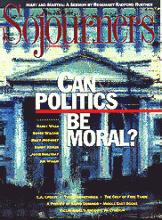What's a person to do? To approach political issues from a faith perspective is never easy; but how do we relate to this election?
Unfortunately, this dilemma is familiar by now, and we have struggled with it before--every time we confront the choice of voting for alternatives that generate no confidence and little hope. The agony of the choices, itself, suggests the roots of the problem.
The issue is not political purism, as some critics might suggest; rather it is a fundamental lack of moral substance in American politics. In one guise or another, the political status quo seems always to win, and new political imagination never has a chance. After a while, we begin to recognize that this is more than a personnel problem; the causes seem systemic.
Just as we believe that faith must be put into action, we refuse to give up the conviction that morality and politics are profoundly related. So why does it always feel like mixing oil and water? The moral issues at the heart of the public debate are usually unrecognized and ignored, or, worse yet, manipulated and twisted for politically self-serving and ideological purposes.
Genuine moral discourse and discernment seem so out of place in the media's political coverage and endless polling of voters. When "moral issues" do come up they tend to be narrowly defined and become the basis for the politics of exclusion instead of opening doors to compassion and justice.
Read the Full Article

